Analyzing Recruitment for Talent Management to Enhance Performance
VerifiedAdded on 2022/12/27
|21
|4696
|1
Report
AI Summary
This report examines the critical role of recruitment processes in talent management, using Unilever as a case study. The research investigates the significance of recruiting talented staff to enhance organizational performance. The report delves into Unilever's recruitment practices, analyzing how they contribute to employee retention, skill utilization, and overall company success. It explores the aims and rationale of the research, including the role of HR in identifying and attracting top talent. The methodology includes a literature review, research philosophy, approach, and data collection methods. The report analyzes both primary and secondary data sources, including questionnaires and literature reviews, to identify key issues and recommend improvements in HR practices. The study addresses research questions about talent management, HR roles, recruitment elements, and HR practice challenges, providing a detailed overview of talent management strategies and their impact on organizational outcomes.
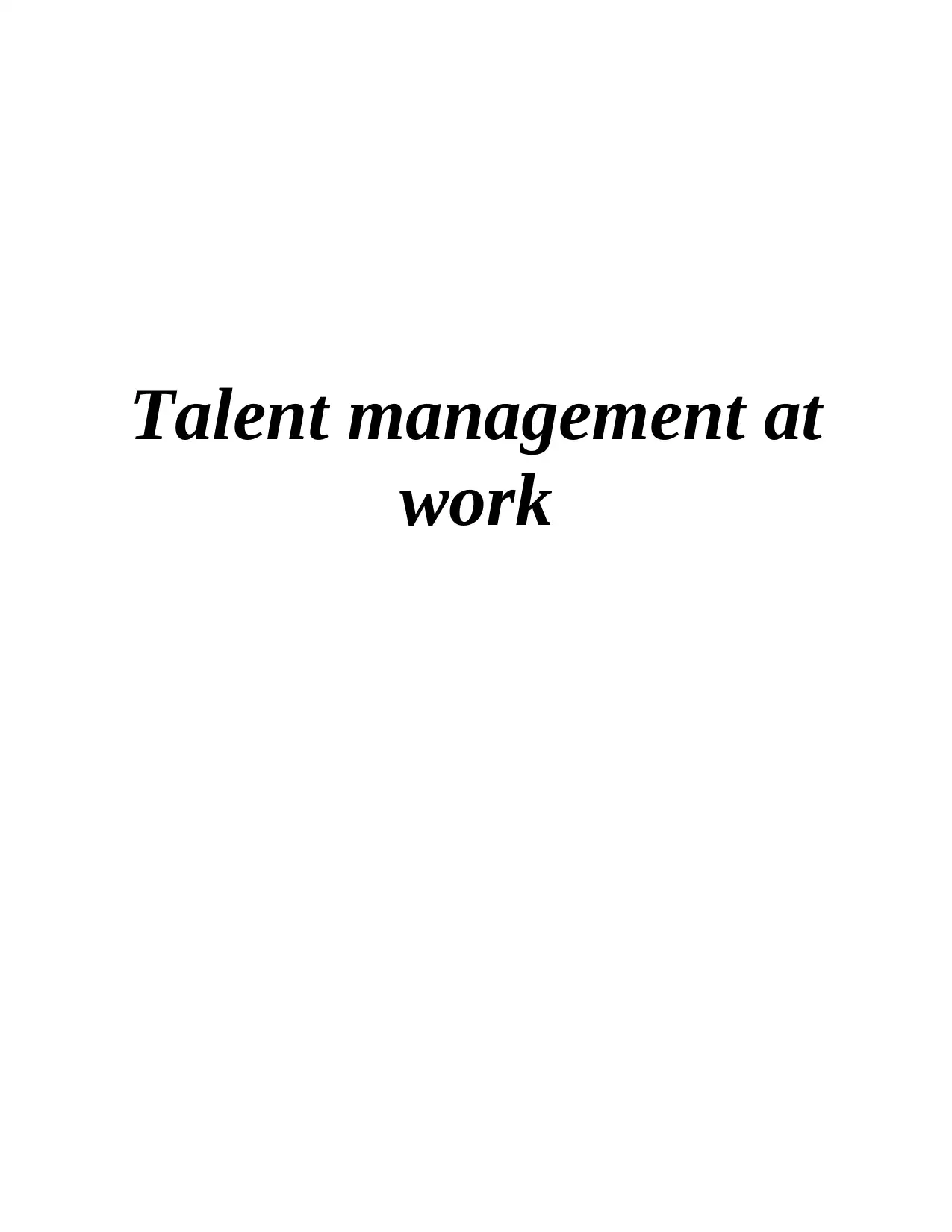
Talent management at
work
work
Paraphrase This Document
Need a fresh take? Get an instant paraphrase of this document with our AI Paraphraser
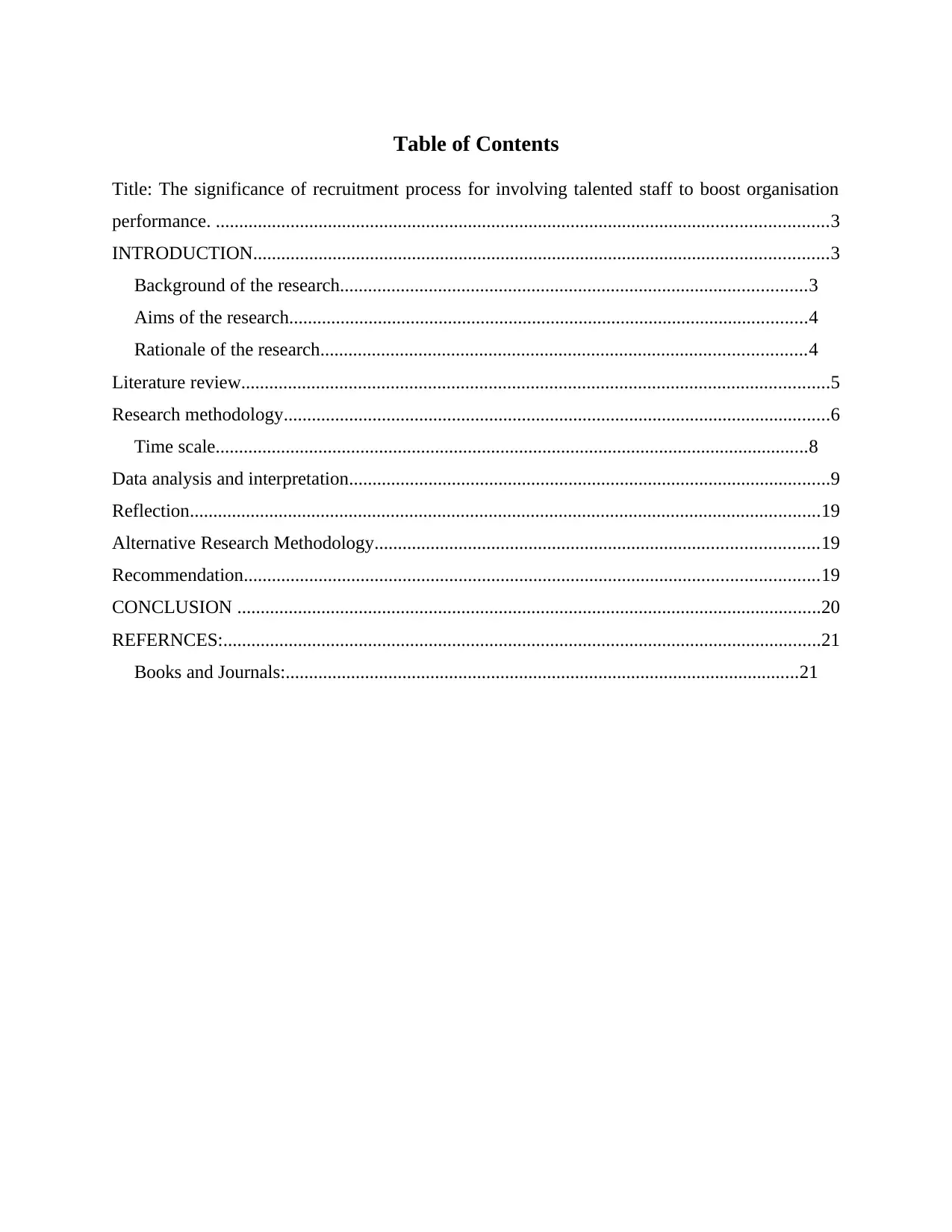
Table of Contents
Title: The significance of recruitment process for involving talented staff to boost organisation
performance. ...................................................................................................................................3
INTRODUCTION...........................................................................................................................3
Background of the research....................................................................................................3
Aims of the research...............................................................................................................4
Rationale of the research........................................................................................................4
Literature review..............................................................................................................................5
Research methodology.....................................................................................................................6
Time scale...............................................................................................................................8
Data analysis and interpretation.......................................................................................................9
Reflection.......................................................................................................................................19
Alternative Research Methodology...............................................................................................19
Recommendation...........................................................................................................................19
CONCLUSION .............................................................................................................................20
REFERNCES:................................................................................................................................21
Books and Journals:..............................................................................................................21
Title: The significance of recruitment process for involving talented staff to boost organisation
performance. ...................................................................................................................................3
INTRODUCTION...........................................................................................................................3
Background of the research....................................................................................................3
Aims of the research...............................................................................................................4
Rationale of the research........................................................................................................4
Literature review..............................................................................................................................5
Research methodology.....................................................................................................................6
Time scale...............................................................................................................................8
Data analysis and interpretation.......................................................................................................9
Reflection.......................................................................................................................................19
Alternative Research Methodology...............................................................................................19
Recommendation...........................................................................................................................19
CONCLUSION .............................................................................................................................20
REFERNCES:................................................................................................................................21
Books and Journals:..............................................................................................................21
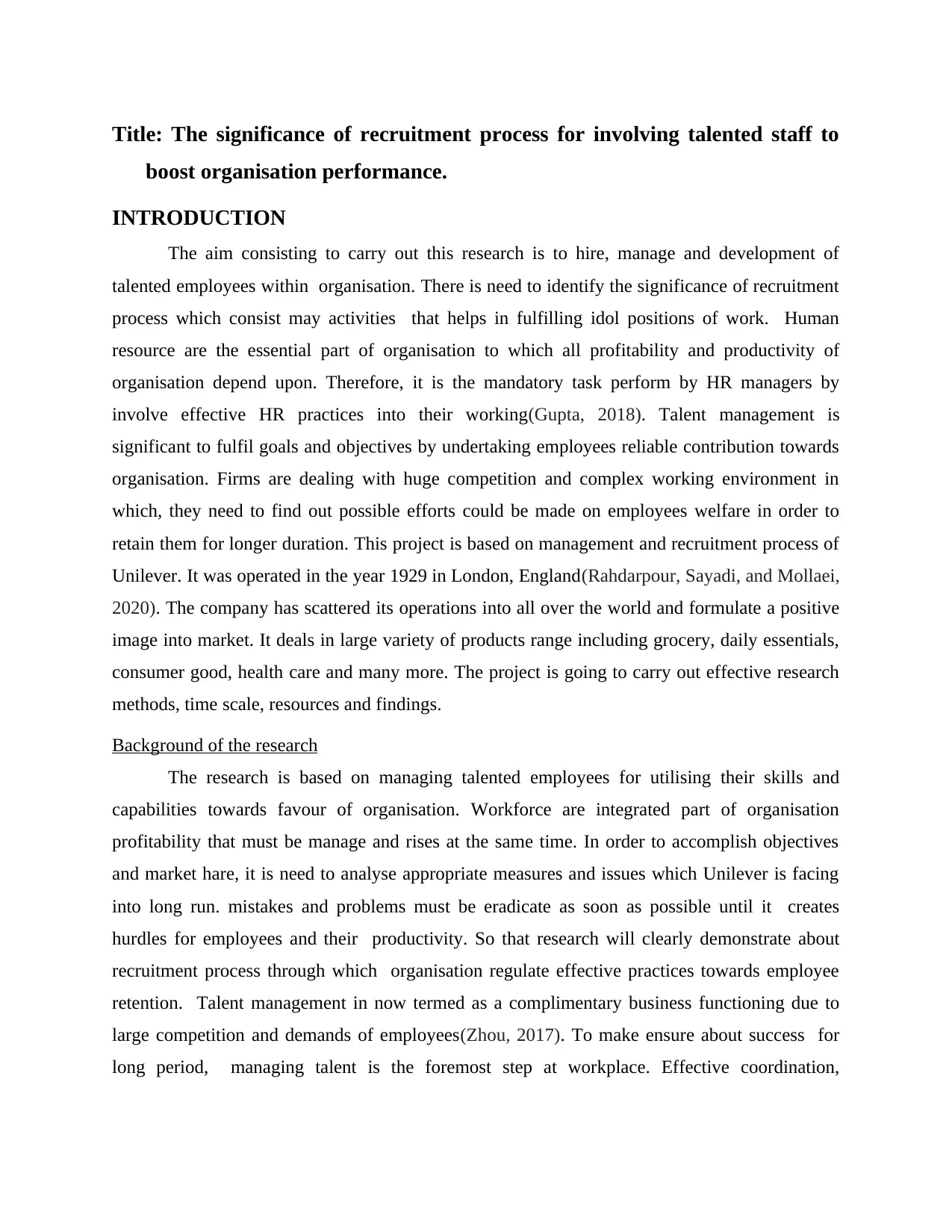
Title: The significance of recruitment process for involving talented staff to
boost organisation performance.
INTRODUCTION
The aim consisting to carry out this research is to hire, manage and development of
talented employees within organisation. There is need to identify the significance of recruitment
process which consist may activities that helps in fulfilling idol positions of work. Human
resource are the essential part of organisation to which all profitability and productivity of
organisation depend upon. Therefore, it is the mandatory task perform by HR managers by
involve effective HR practices into their working(Gupta, 2018). Talent management is
significant to fulfil goals and objectives by undertaking employees reliable contribution towards
organisation. Firms are dealing with huge competition and complex working environment in
which, they need to find out possible efforts could be made on employees welfare in order to
retain them for longer duration. This project is based on management and recruitment process of
Unilever. It was operated in the year 1929 in London, England(Rahdarpour, Sayadi, and Mollaei,
2020). The company has scattered its operations into all over the world and formulate a positive
image into market. It deals in large variety of products range including grocery, daily essentials,
consumer good, health care and many more. The project is going to carry out effective research
methods, time scale, resources and findings.
Background of the research
The research is based on managing talented employees for utilising their skills and
capabilities towards favour of organisation. Workforce are integrated part of organisation
profitability that must be manage and rises at the same time. In order to accomplish objectives
and market hare, it is need to analyse appropriate measures and issues which Unilever is facing
into long run. mistakes and problems must be eradicate as soon as possible until it creates
hurdles for employees and their productivity. So that research will clearly demonstrate about
recruitment process through which organisation regulate effective practices towards employee
retention. Talent management in now termed as a complimentary business functioning due to
large competition and demands of employees(Zhou, 2017). To make ensure about success for
long period, managing talent is the foremost step at workplace. Effective coordination,
boost organisation performance.
INTRODUCTION
The aim consisting to carry out this research is to hire, manage and development of
talented employees within organisation. There is need to identify the significance of recruitment
process which consist may activities that helps in fulfilling idol positions of work. Human
resource are the essential part of organisation to which all profitability and productivity of
organisation depend upon. Therefore, it is the mandatory task perform by HR managers by
involve effective HR practices into their working(Gupta, 2018). Talent management is
significant to fulfil goals and objectives by undertaking employees reliable contribution towards
organisation. Firms are dealing with huge competition and complex working environment in
which, they need to find out possible efforts could be made on employees welfare in order to
retain them for longer duration. This project is based on management and recruitment process of
Unilever. It was operated in the year 1929 in London, England(Rahdarpour, Sayadi, and Mollaei,
2020). The company has scattered its operations into all over the world and formulate a positive
image into market. It deals in large variety of products range including grocery, daily essentials,
consumer good, health care and many more. The project is going to carry out effective research
methods, time scale, resources and findings.
Background of the research
The research is based on managing talented employees for utilising their skills and
capabilities towards favour of organisation. Workforce are integrated part of organisation
profitability that must be manage and rises at the same time. In order to accomplish objectives
and market hare, it is need to analyse appropriate measures and issues which Unilever is facing
into long run. mistakes and problems must be eradicate as soon as possible until it creates
hurdles for employees and their productivity. So that research will clearly demonstrate about
recruitment process through which organisation regulate effective practices towards employee
retention. Talent management in now termed as a complimentary business functioning due to
large competition and demands of employees(Zhou, 2017). To make ensure about success for
long period, managing talent is the foremost step at workplace. Effective coordination,
⊘ This is a preview!⊘
Do you want full access?
Subscribe today to unlock all pages.

Trusted by 1+ million students worldwide
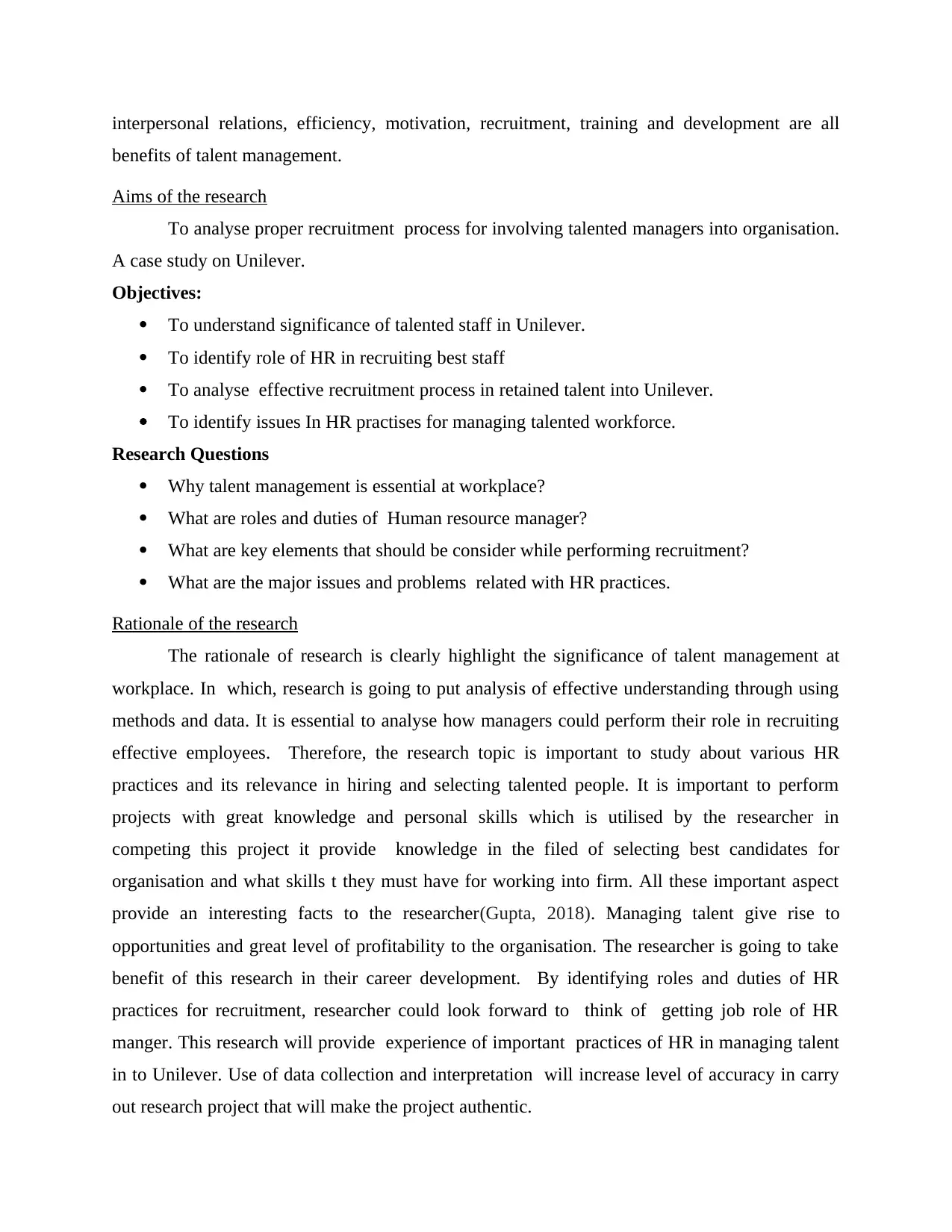
interpersonal relations, efficiency, motivation, recruitment, training and development are all
benefits of talent management.
Aims of the research
To analyse proper recruitment process for involving talented managers into organisation.
A case study on Unilever.
Objectives:
To understand significance of talented staff in Unilever.
To identify role of HR in recruiting best staff
To analyse effective recruitment process in retained talent into Unilever.
To identify issues In HR practises for managing talented workforce.
Research Questions
Why talent management is essential at workplace?
What are roles and duties of Human resource manager?
What are key elements that should be consider while performing recruitment?
What are the major issues and problems related with HR practices.
Rationale of the research
The rationale of research is clearly highlight the significance of talent management at
workplace. In which, research is going to put analysis of effective understanding through using
methods and data. It is essential to analyse how managers could perform their role in recruiting
effective employees. Therefore, the research topic is important to study about various HR
practices and its relevance in hiring and selecting talented people. It is important to perform
projects with great knowledge and personal skills which is utilised by the researcher in
competing this project it provide knowledge in the filed of selecting best candidates for
organisation and what skills t they must have for working into firm. All these important aspect
provide an interesting facts to the researcher(Gupta, 2018). Managing talent give rise to
opportunities and great level of profitability to the organisation. The researcher is going to take
benefit of this research in their career development. By identifying roles and duties of HR
practices for recruitment, researcher could look forward to think of getting job role of HR
manger. This research will provide experience of important practices of HR in managing talent
in to Unilever. Use of data collection and interpretation will increase level of accuracy in carry
out research project that will make the project authentic.
benefits of talent management.
Aims of the research
To analyse proper recruitment process for involving talented managers into organisation.
A case study on Unilever.
Objectives:
To understand significance of talented staff in Unilever.
To identify role of HR in recruiting best staff
To analyse effective recruitment process in retained talent into Unilever.
To identify issues In HR practises for managing talented workforce.
Research Questions
Why talent management is essential at workplace?
What are roles and duties of Human resource manager?
What are key elements that should be consider while performing recruitment?
What are the major issues and problems related with HR practices.
Rationale of the research
The rationale of research is clearly highlight the significance of talent management at
workplace. In which, research is going to put analysis of effective understanding through using
methods and data. It is essential to analyse how managers could perform their role in recruiting
effective employees. Therefore, the research topic is important to study about various HR
practices and its relevance in hiring and selecting talented people. It is important to perform
projects with great knowledge and personal skills which is utilised by the researcher in
competing this project it provide knowledge in the filed of selecting best candidates for
organisation and what skills t they must have for working into firm. All these important aspect
provide an interesting facts to the researcher(Gupta, 2018). Managing talent give rise to
opportunities and great level of profitability to the organisation. The researcher is going to take
benefit of this research in their career development. By identifying roles and duties of HR
practices for recruitment, researcher could look forward to think of getting job role of HR
manger. This research will provide experience of important practices of HR in managing talent
in to Unilever. Use of data collection and interpretation will increase level of accuracy in carry
out research project that will make the project authentic.
Paraphrase This Document
Need a fresh take? Get an instant paraphrase of this document with our AI Paraphraser
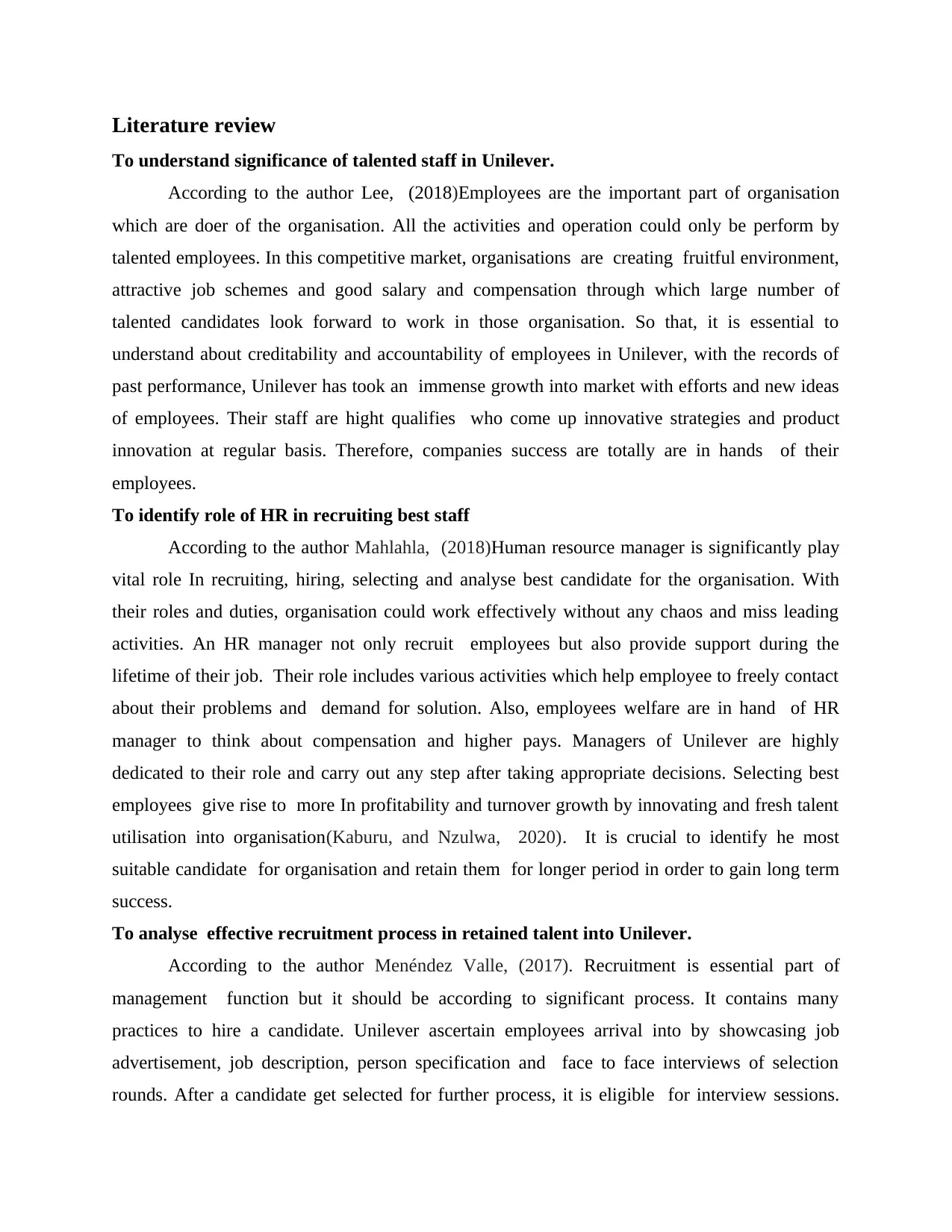
Literature review
To understand significance of talented staff in Unilever.
According to the author Lee, (2018)Employees are the important part of organisation
which are doer of the organisation. All the activities and operation could only be perform by
talented employees. In this competitive market, organisations are creating fruitful environment,
attractive job schemes and good salary and compensation through which large number of
talented candidates look forward to work in those organisation. So that, it is essential to
understand about creditability and accountability of employees in Unilever, with the records of
past performance, Unilever has took an immense growth into market with efforts and new ideas
of employees. Their staff are hight qualifies who come up innovative strategies and product
innovation at regular basis. Therefore, companies success are totally are in hands of their
employees.
To identify role of HR in recruiting best staff
According to the author Mahlahla, (2018)Human resource manager is significantly play
vital role In recruiting, hiring, selecting and analyse best candidate for the organisation. With
their roles and duties, organisation could work effectively without any chaos and miss leading
activities. An HR manager not only recruit employees but also provide support during the
lifetime of their job. Their role includes various activities which help employee to freely contact
about their problems and demand for solution. Also, employees welfare are in hand of HR
manager to think about compensation and higher pays. Managers of Unilever are highly
dedicated to their role and carry out any step after taking appropriate decisions. Selecting best
employees give rise to more In profitability and turnover growth by innovating and fresh talent
utilisation into organisation(Kaburu, and Nzulwa, 2020). It is crucial to identify he most
suitable candidate for organisation and retain them for longer period in order to gain long term
success.
To analyse effective recruitment process in retained talent into Unilever.
According to the author Menéndez Valle, (2017). Recruitment is essential part of
management function but it should be according to significant process. It contains many
practices to hire a candidate. Unilever ascertain employees arrival into by showcasing job
advertisement, job description, person specification and face to face interviews of selection
rounds. After a candidate get selected for further process, it is eligible for interview sessions.
To understand significance of talented staff in Unilever.
According to the author Lee, (2018)Employees are the important part of organisation
which are doer of the organisation. All the activities and operation could only be perform by
talented employees. In this competitive market, organisations are creating fruitful environment,
attractive job schemes and good salary and compensation through which large number of
talented candidates look forward to work in those organisation. So that, it is essential to
understand about creditability and accountability of employees in Unilever, with the records of
past performance, Unilever has took an immense growth into market with efforts and new ideas
of employees. Their staff are hight qualifies who come up innovative strategies and product
innovation at regular basis. Therefore, companies success are totally are in hands of their
employees.
To identify role of HR in recruiting best staff
According to the author Mahlahla, (2018)Human resource manager is significantly play
vital role In recruiting, hiring, selecting and analyse best candidate for the organisation. With
their roles and duties, organisation could work effectively without any chaos and miss leading
activities. An HR manager not only recruit employees but also provide support during the
lifetime of their job. Their role includes various activities which help employee to freely contact
about their problems and demand for solution. Also, employees welfare are in hand of HR
manager to think about compensation and higher pays. Managers of Unilever are highly
dedicated to their role and carry out any step after taking appropriate decisions. Selecting best
employees give rise to more In profitability and turnover growth by innovating and fresh talent
utilisation into organisation(Kaburu, and Nzulwa, 2020). It is crucial to identify he most
suitable candidate for organisation and retain them for longer period in order to gain long term
success.
To analyse effective recruitment process in retained talent into Unilever.
According to the author Menéndez Valle, (2017). Recruitment is essential part of
management function but it should be according to significant process. It contains many
practices to hire a candidate. Unilever ascertain employees arrival into by showcasing job
advertisement, job description, person specification and face to face interviews of selection
rounds. After a candidate get selected for further process, it is eligible for interview sessions.
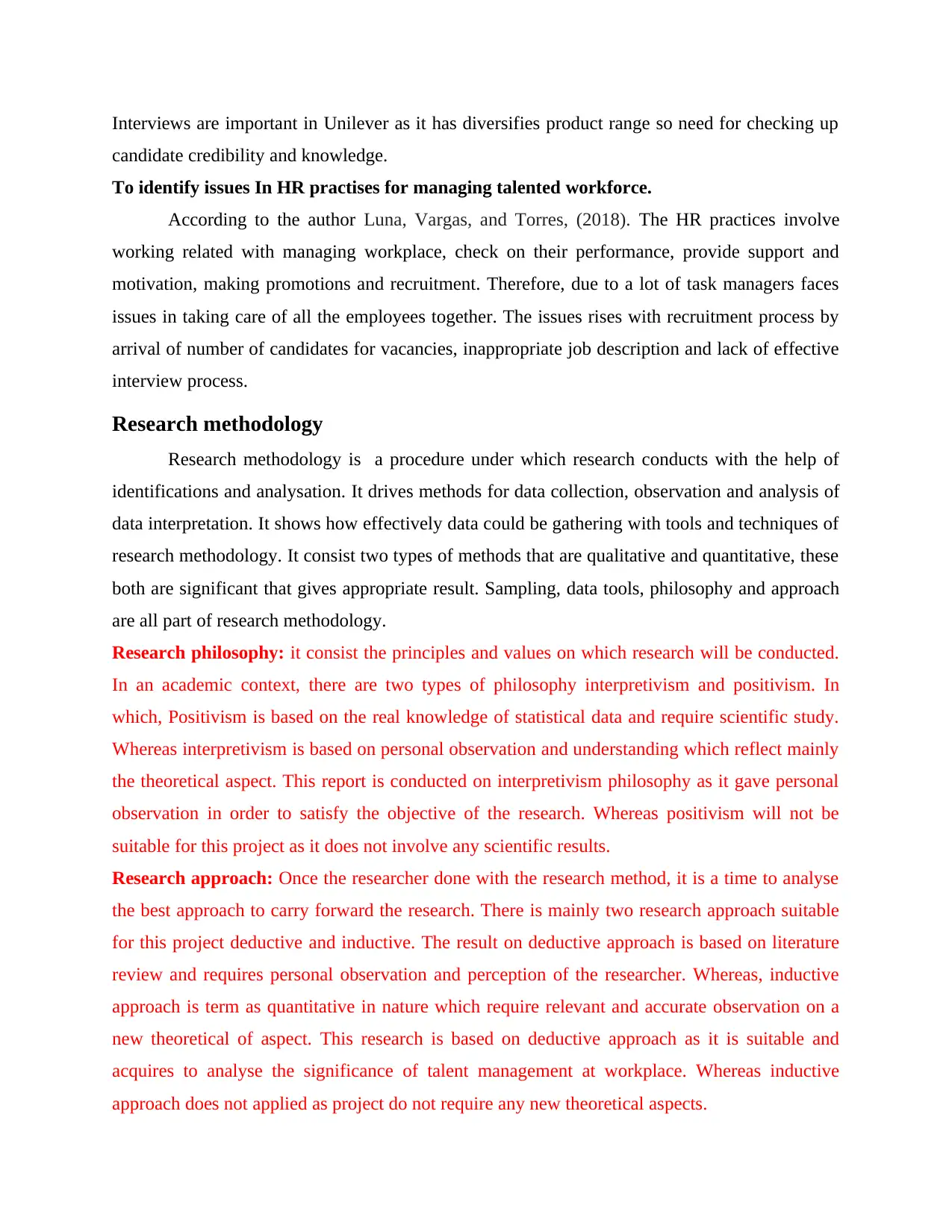
Interviews are important in Unilever as it has diversifies product range so need for checking up
candidate credibility and knowledge.
To identify issues In HR practises for managing talented workforce.
According to the author Luna, Vargas, and Torres, (2018). The HR practices involve
working related with managing workplace, check on their performance, provide support and
motivation, making promotions and recruitment. Therefore, due to a lot of task managers faces
issues in taking care of all the employees together. The issues rises with recruitment process by
arrival of number of candidates for vacancies, inappropriate job description and lack of effective
interview process.
Research methodology
Research methodology is a procedure under which research conducts with the help of
identifications and analysation. It drives methods for data collection, observation and analysis of
data interpretation. It shows how effectively data could be gathering with tools and techniques of
research methodology. It consist two types of methods that are qualitative and quantitative, these
both are significant that gives appropriate result. Sampling, data tools, philosophy and approach
are all part of research methodology.
Research philosophy: it consist the principles and values on which research will be conducted.
In an academic context, there are two types of philosophy interpretivism and positivism. In
which, Positivism is based on the real knowledge of statistical data and require scientific study.
Whereas interpretivism is based on personal observation and understanding which reflect mainly
the theoretical aspect. This report is conducted on interpretivism philosophy as it gave personal
observation in order to satisfy the objective of the research. Whereas positivism will not be
suitable for this project as it does not involve any scientific results.
Research approach: Once the researcher done with the research method, it is a time to analyse
the best approach to carry forward the research. There is mainly two research approach suitable
for this project deductive and inductive. The result on deductive approach is based on literature
review and requires personal observation and perception of the researcher. Whereas, inductive
approach is term as quantitative in nature which require relevant and accurate observation on a
new theoretical of aspect. This research is based on deductive approach as it is suitable and
acquires to analyse the significance of talent management at workplace. Whereas inductive
approach does not applied as project do not require any new theoretical aspects.
candidate credibility and knowledge.
To identify issues In HR practises for managing talented workforce.
According to the author Luna, Vargas, and Torres, (2018). The HR practices involve
working related with managing workplace, check on their performance, provide support and
motivation, making promotions and recruitment. Therefore, due to a lot of task managers faces
issues in taking care of all the employees together. The issues rises with recruitment process by
arrival of number of candidates for vacancies, inappropriate job description and lack of effective
interview process.
Research methodology
Research methodology is a procedure under which research conducts with the help of
identifications and analysation. It drives methods for data collection, observation and analysis of
data interpretation. It shows how effectively data could be gathering with tools and techniques of
research methodology. It consist two types of methods that are qualitative and quantitative, these
both are significant that gives appropriate result. Sampling, data tools, philosophy and approach
are all part of research methodology.
Research philosophy: it consist the principles and values on which research will be conducted.
In an academic context, there are two types of philosophy interpretivism and positivism. In
which, Positivism is based on the real knowledge of statistical data and require scientific study.
Whereas interpretivism is based on personal observation and understanding which reflect mainly
the theoretical aspect. This report is conducted on interpretivism philosophy as it gave personal
observation in order to satisfy the objective of the research. Whereas positivism will not be
suitable for this project as it does not involve any scientific results.
Research approach: Once the researcher done with the research method, it is a time to analyse
the best approach to carry forward the research. There is mainly two research approach suitable
for this project deductive and inductive. The result on deductive approach is based on literature
review and requires personal observation and perception of the researcher. Whereas, inductive
approach is term as quantitative in nature which require relevant and accurate observation on a
new theoretical of aspect. This research is based on deductive approach as it is suitable and
acquires to analyse the significance of talent management at workplace. Whereas inductive
approach does not applied as project do not require any new theoretical aspects.
⊘ This is a preview!⊘
Do you want full access?
Subscribe today to unlock all pages.

Trusted by 1+ million students worldwide
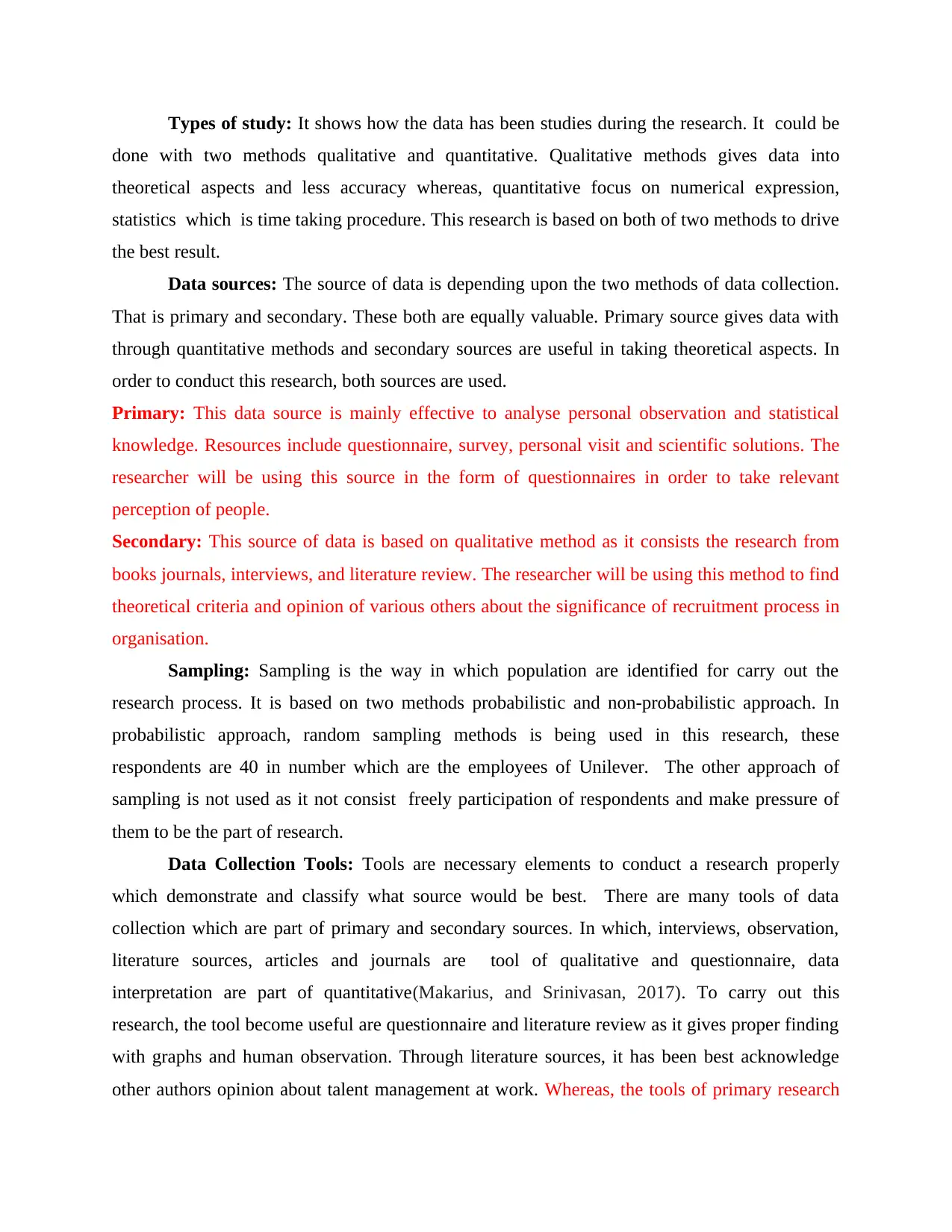
Types of study: It shows how the data has been studies during the research. It could be
done with two methods qualitative and quantitative. Qualitative methods gives data into
theoretical aspects and less accuracy whereas, quantitative focus on numerical expression,
statistics which is time taking procedure. This research is based on both of two methods to drive
the best result.
Data sources: The source of data is depending upon the two methods of data collection.
That is primary and secondary. These both are equally valuable. Primary source gives data with
through quantitative methods and secondary sources are useful in taking theoretical aspects. In
order to conduct this research, both sources are used.
Primary: This data source is mainly effective to analyse personal observation and statistical
knowledge. Resources include questionnaire, survey, personal visit and scientific solutions. The
researcher will be using this source in the form of questionnaires in order to take relevant
perception of people.
Secondary: This source of data is based on qualitative method as it consists the research from
books journals, interviews, and literature review. The researcher will be using this method to find
theoretical criteria and opinion of various others about the significance of recruitment process in
organisation.
Sampling: Sampling is the way in which population are identified for carry out the
research process. It is based on two methods probabilistic and non-probabilistic approach. In
probabilistic approach, random sampling methods is being used in this research, these
respondents are 40 in number which are the employees of Unilever. The other approach of
sampling is not used as it not consist freely participation of respondents and make pressure of
them to be the part of research.
Data Collection Tools: Tools are necessary elements to conduct a research properly
which demonstrate and classify what source would be best. There are many tools of data
collection which are part of primary and secondary sources. In which, interviews, observation,
literature sources, articles and journals are tool of qualitative and questionnaire, data
interpretation are part of quantitative(Makarius, and Srinivasan, 2017). To carry out this
research, the tool become useful are questionnaire and literature review as it gives proper finding
with graphs and human observation. Through literature sources, it has been best acknowledge
other authors opinion about talent management at work. Whereas, the tools of primary research
done with two methods qualitative and quantitative. Qualitative methods gives data into
theoretical aspects and less accuracy whereas, quantitative focus on numerical expression,
statistics which is time taking procedure. This research is based on both of two methods to drive
the best result.
Data sources: The source of data is depending upon the two methods of data collection.
That is primary and secondary. These both are equally valuable. Primary source gives data with
through quantitative methods and secondary sources are useful in taking theoretical aspects. In
order to conduct this research, both sources are used.
Primary: This data source is mainly effective to analyse personal observation and statistical
knowledge. Resources include questionnaire, survey, personal visit and scientific solutions. The
researcher will be using this source in the form of questionnaires in order to take relevant
perception of people.
Secondary: This source of data is based on qualitative method as it consists the research from
books journals, interviews, and literature review. The researcher will be using this method to find
theoretical criteria and opinion of various others about the significance of recruitment process in
organisation.
Sampling: Sampling is the way in which population are identified for carry out the
research process. It is based on two methods probabilistic and non-probabilistic approach. In
probabilistic approach, random sampling methods is being used in this research, these
respondents are 40 in number which are the employees of Unilever. The other approach of
sampling is not used as it not consist freely participation of respondents and make pressure of
them to be the part of research.
Data Collection Tools: Tools are necessary elements to conduct a research properly
which demonstrate and classify what source would be best. There are many tools of data
collection which are part of primary and secondary sources. In which, interviews, observation,
literature sources, articles and journals are tool of qualitative and questionnaire, data
interpretation are part of quantitative(Makarius, and Srinivasan, 2017). To carry out this
research, the tool become useful are questionnaire and literature review as it gives proper finding
with graphs and human observation. Through literature sources, it has been best acknowledge
other authors opinion about talent management at work. Whereas, the tools of primary research
Paraphrase This Document
Need a fresh take? Get an instant paraphrase of this document with our AI Paraphraser
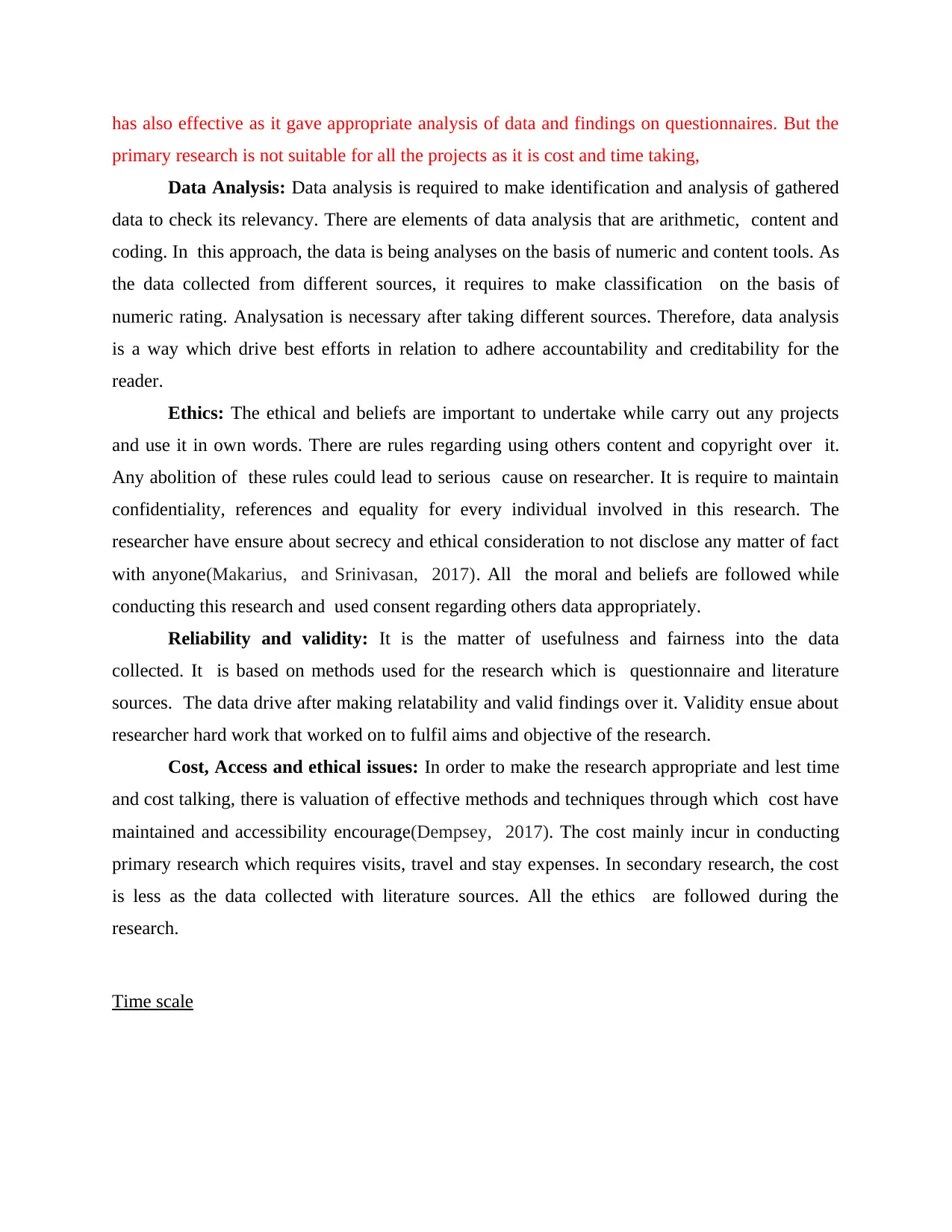
has also effective as it gave appropriate analysis of data and findings on questionnaires. But the
primary research is not suitable for all the projects as it is cost and time taking,
Data Analysis: Data analysis is required to make identification and analysis of gathered
data to check its relevancy. There are elements of data analysis that are arithmetic, content and
coding. In this approach, the data is being analyses on the basis of numeric and content tools. As
the data collected from different sources, it requires to make classification on the basis of
numeric rating. Analysation is necessary after taking different sources. Therefore, data analysis
is a way which drive best efforts in relation to adhere accountability and creditability for the
reader.
Ethics: The ethical and beliefs are important to undertake while carry out any projects
and use it in own words. There are rules regarding using others content and copyright over it.
Any abolition of these rules could lead to serious cause on researcher. It is require to maintain
confidentiality, references and equality for every individual involved in this research. The
researcher have ensure about secrecy and ethical consideration to not disclose any matter of fact
with anyone(Makarius, and Srinivasan, 2017). All the moral and beliefs are followed while
conducting this research and used consent regarding others data appropriately.
Reliability and validity: It is the matter of usefulness and fairness into the data
collected. It is based on methods used for the research which is questionnaire and literature
sources. The data drive after making relatability and valid findings over it. Validity ensue about
researcher hard work that worked on to fulfil aims and objective of the research.
Cost, Access and ethical issues: In order to make the research appropriate and lest time
and cost talking, there is valuation of effective methods and techniques through which cost have
maintained and accessibility encourage(Dempsey, 2017). The cost mainly incur in conducting
primary research which requires visits, travel and stay expenses. In secondary research, the cost
is less as the data collected with literature sources. All the ethics are followed during the
research.
Time scale
primary research is not suitable for all the projects as it is cost and time taking,
Data Analysis: Data analysis is required to make identification and analysis of gathered
data to check its relevancy. There are elements of data analysis that are arithmetic, content and
coding. In this approach, the data is being analyses on the basis of numeric and content tools. As
the data collected from different sources, it requires to make classification on the basis of
numeric rating. Analysation is necessary after taking different sources. Therefore, data analysis
is a way which drive best efforts in relation to adhere accountability and creditability for the
reader.
Ethics: The ethical and beliefs are important to undertake while carry out any projects
and use it in own words. There are rules regarding using others content and copyright over it.
Any abolition of these rules could lead to serious cause on researcher. It is require to maintain
confidentiality, references and equality for every individual involved in this research. The
researcher have ensure about secrecy and ethical consideration to not disclose any matter of fact
with anyone(Makarius, and Srinivasan, 2017). All the moral and beliefs are followed while
conducting this research and used consent regarding others data appropriately.
Reliability and validity: It is the matter of usefulness and fairness into the data
collected. It is based on methods used for the research which is questionnaire and literature
sources. The data drive after making relatability and valid findings over it. Validity ensue about
researcher hard work that worked on to fulfil aims and objective of the research.
Cost, Access and ethical issues: In order to make the research appropriate and lest time
and cost talking, there is valuation of effective methods and techniques through which cost have
maintained and accessibility encourage(Dempsey, 2017). The cost mainly incur in conducting
primary research which requires visits, travel and stay expenses. In secondary research, the cost
is less as the data collected with literature sources. All the ethics are followed during the
research.
Time scale
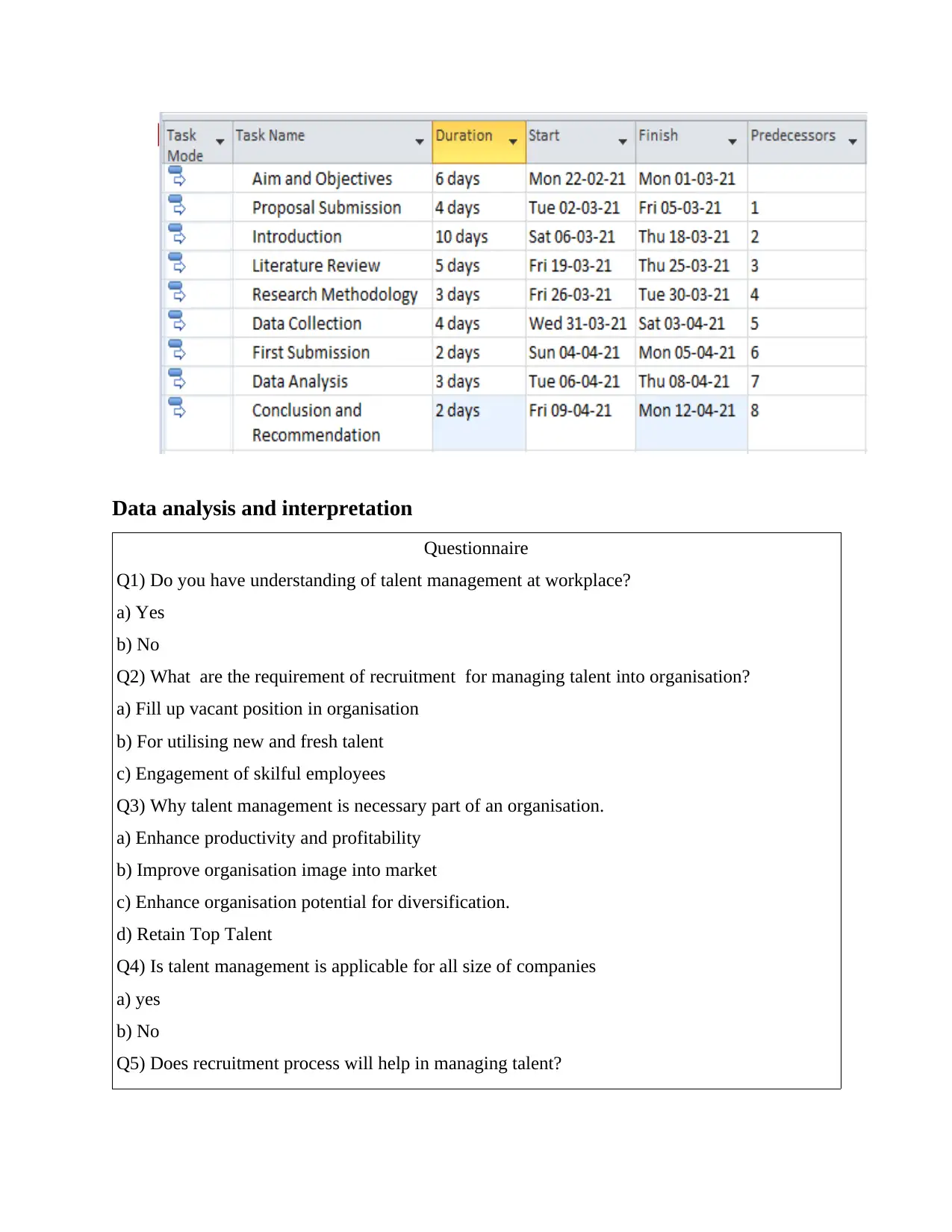
Data analysis and interpretation
Questionnaire
Q1) Do you have understanding of talent management at workplace?
a) Yes
b) No
Q2) What are the requirement of recruitment for managing talent into organisation?
a) Fill up vacant position in organisation
b) For utilising new and fresh talent
c) Engagement of skilful employees
Q3) Why talent management is necessary part of an organisation.
a) Enhance productivity and profitability
b) Improve organisation image into market
c) Enhance organisation potential for diversification.
d) Retain Top Talent
Q4) Is talent management is applicable for all size of companies
a) yes
b) No
Q5) Does recruitment process will help in managing talent?
Questionnaire
Q1) Do you have understanding of talent management at workplace?
a) Yes
b) No
Q2) What are the requirement of recruitment for managing talent into organisation?
a) Fill up vacant position in organisation
b) For utilising new and fresh talent
c) Engagement of skilful employees
Q3) Why talent management is necessary part of an organisation.
a) Enhance productivity and profitability
b) Improve organisation image into market
c) Enhance organisation potential for diversification.
d) Retain Top Talent
Q4) Is talent management is applicable for all size of companies
a) yes
b) No
Q5) Does recruitment process will help in managing talent?
⊘ This is a preview!⊘
Do you want full access?
Subscribe today to unlock all pages.

Trusted by 1+ million students worldwide
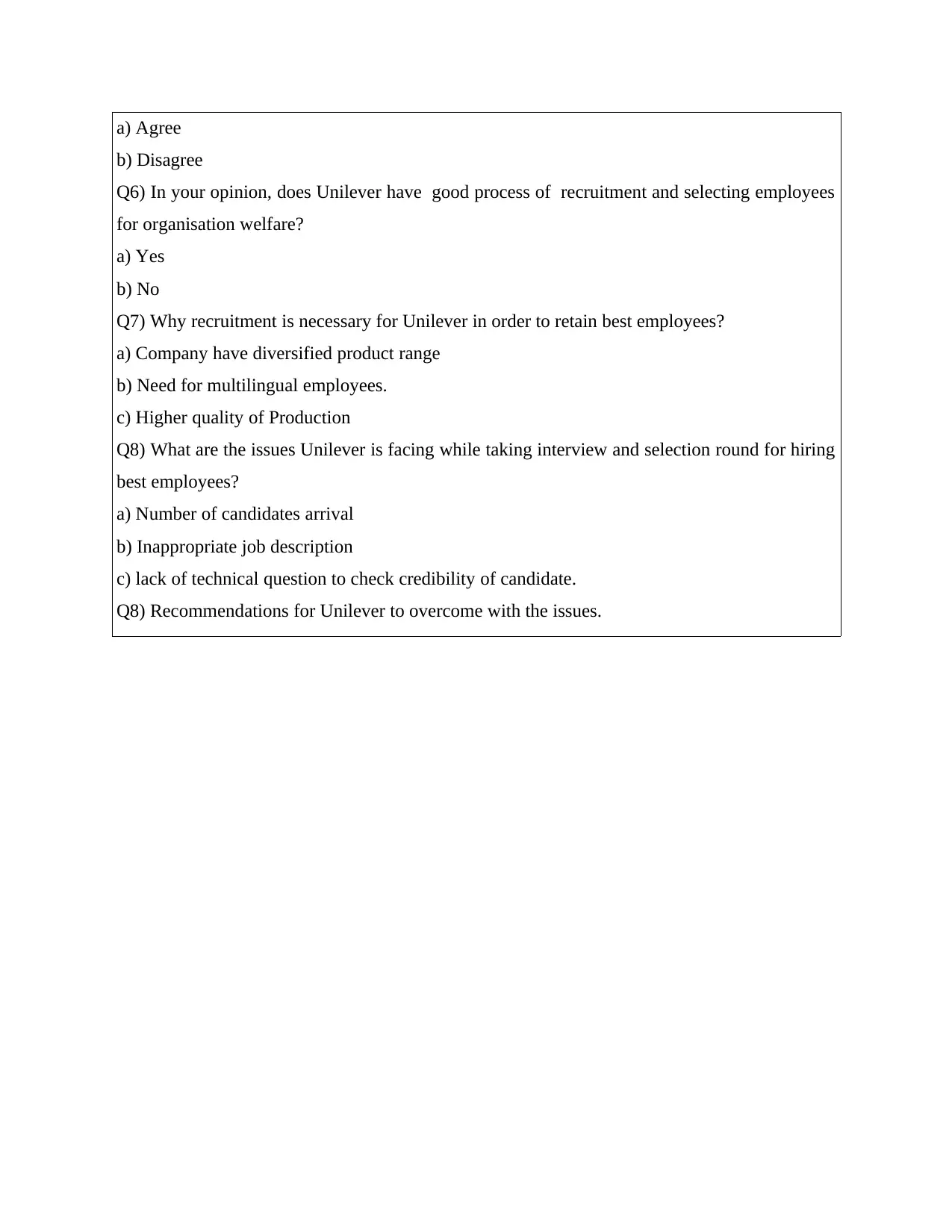
a) Agree
b) Disagree
Q6) In your opinion, does Unilever have good process of recruitment and selecting employees
for organisation welfare?
a) Yes
b) No
Q7) Why recruitment is necessary for Unilever in order to retain best employees?
a) Company have diversified product range
b) Need for multilingual employees.
c) Higher quality of Production
Q8) What are the issues Unilever is facing while taking interview and selection round for hiring
best employees?
a) Number of candidates arrival
b) Inappropriate job description
c) lack of technical question to check credibility of candidate.
Q8) Recommendations for Unilever to overcome with the issues.
b) Disagree
Q6) In your opinion, does Unilever have good process of recruitment and selecting employees
for organisation welfare?
a) Yes
b) No
Q7) Why recruitment is necessary for Unilever in order to retain best employees?
a) Company have diversified product range
b) Need for multilingual employees.
c) Higher quality of Production
Q8) What are the issues Unilever is facing while taking interview and selection round for hiring
best employees?
a) Number of candidates arrival
b) Inappropriate job description
c) lack of technical question to check credibility of candidate.
Q8) Recommendations for Unilever to overcome with the issues.
Paraphrase This Document
Need a fresh take? Get an instant paraphrase of this document with our AI Paraphraser
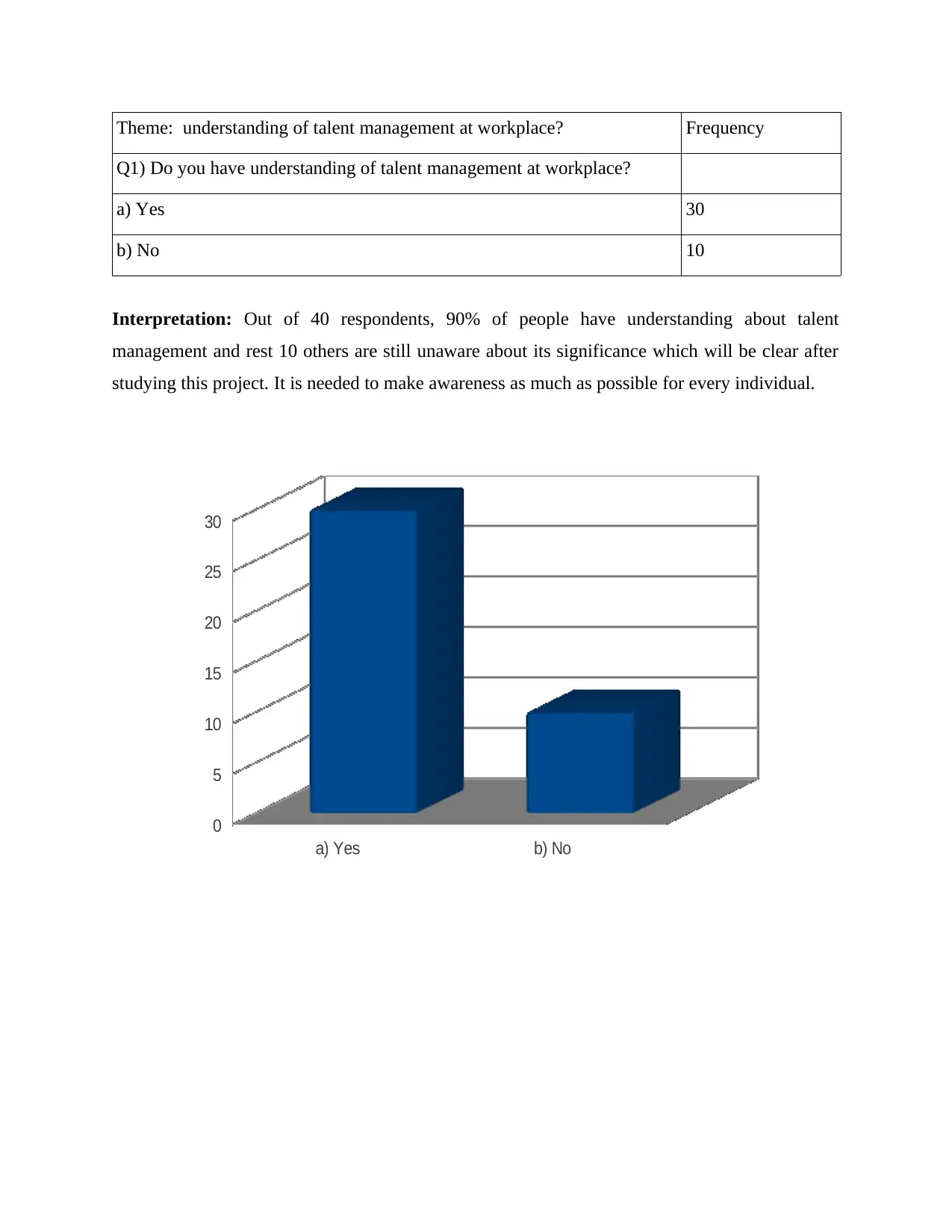
Theme: understanding of talent management at workplace? Frequency
Q1) Do you have understanding of talent management at workplace?
a) Yes 30
b) No 10
Interpretation: Out of 40 respondents, 90% of people have understanding about talent
management and rest 10 others are still unaware about its significance which will be clear after
studying this project. It is needed to make awareness as much as possible for every individual.
a) Yes b) No
0
5
10
15
20
25
30
Q1) Do you have understanding of talent management at workplace?
a) Yes 30
b) No 10
Interpretation: Out of 40 respondents, 90% of people have understanding about talent
management and rest 10 others are still unaware about its significance which will be clear after
studying this project. It is needed to make awareness as much as possible for every individual.
a) Yes b) No
0
5
10
15
20
25
30
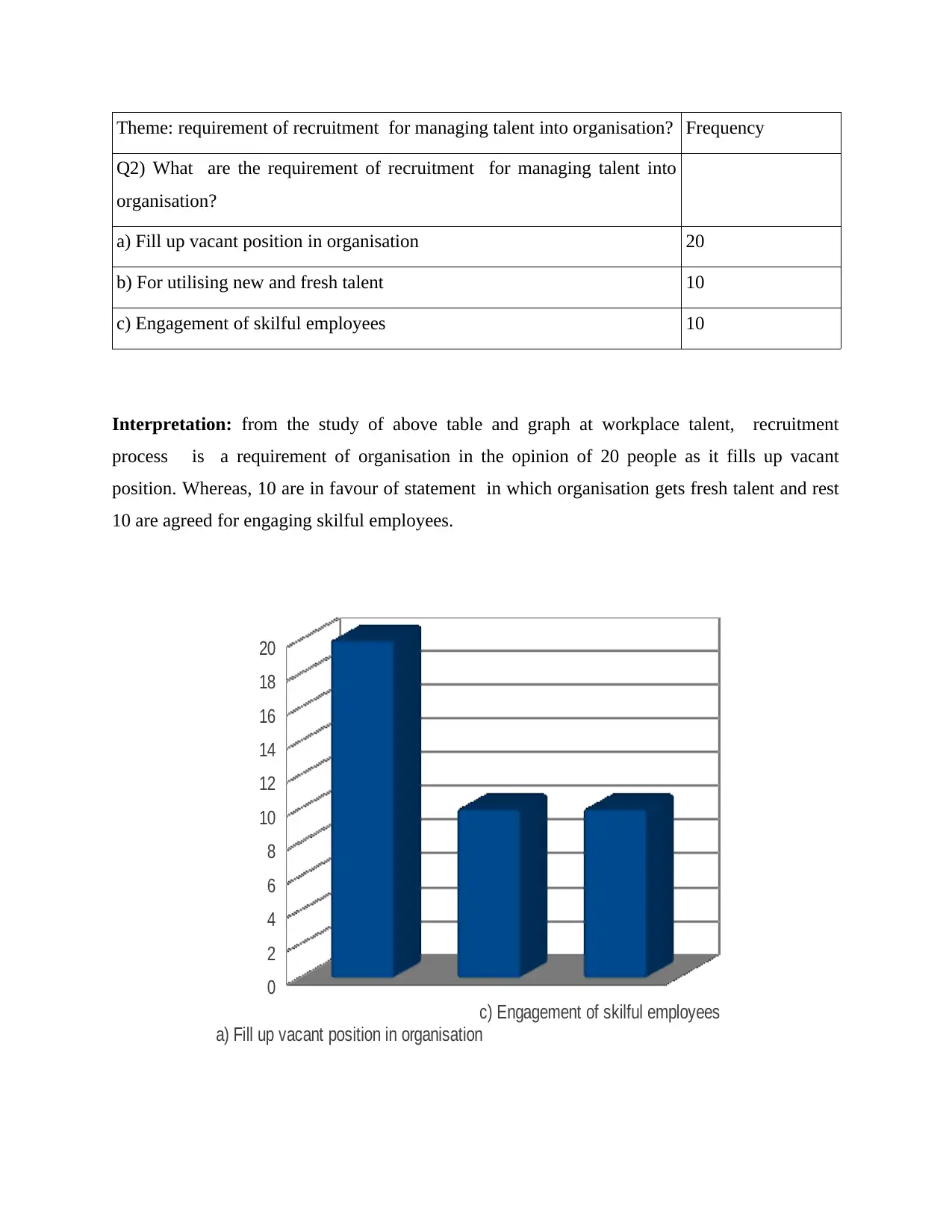
Theme: requirement of recruitment for managing talent into organisation? Frequency
Q2) What are the requirement of recruitment for managing talent into
organisation?
a) Fill up vacant position in organisation 20
b) For utilising new and fresh talent 10
c) Engagement of skilful employees 10
Interpretation: from the study of above table and graph at workplace talent, recruitment
process is a requirement of organisation in the opinion of 20 people as it fills up vacant
position. Whereas, 10 are in favour of statement in which organisation gets fresh talent and rest
10 are agreed for engaging skilful employees.
a) Fill up vacant position in organisation
c) Engagement of skilful employees
0
2
4
6
8
10
12
14
16
18
20
Q2) What are the requirement of recruitment for managing talent into
organisation?
a) Fill up vacant position in organisation 20
b) For utilising new and fresh talent 10
c) Engagement of skilful employees 10
Interpretation: from the study of above table and graph at workplace talent, recruitment
process is a requirement of organisation in the opinion of 20 people as it fills up vacant
position. Whereas, 10 are in favour of statement in which organisation gets fresh talent and rest
10 are agreed for engaging skilful employees.
a) Fill up vacant position in organisation
c) Engagement of skilful employees
0
2
4
6
8
10
12
14
16
18
20
⊘ This is a preview!⊘
Do you want full access?
Subscribe today to unlock all pages.

Trusted by 1+ million students worldwide
1 out of 21
Related Documents
Your All-in-One AI-Powered Toolkit for Academic Success.
+13062052269
info@desklib.com
Available 24*7 on WhatsApp / Email
![[object Object]](/_next/static/media/star-bottom.7253800d.svg)
Unlock your academic potential
Copyright © 2020–2026 A2Z Services. All Rights Reserved. Developed and managed by ZUCOL.





